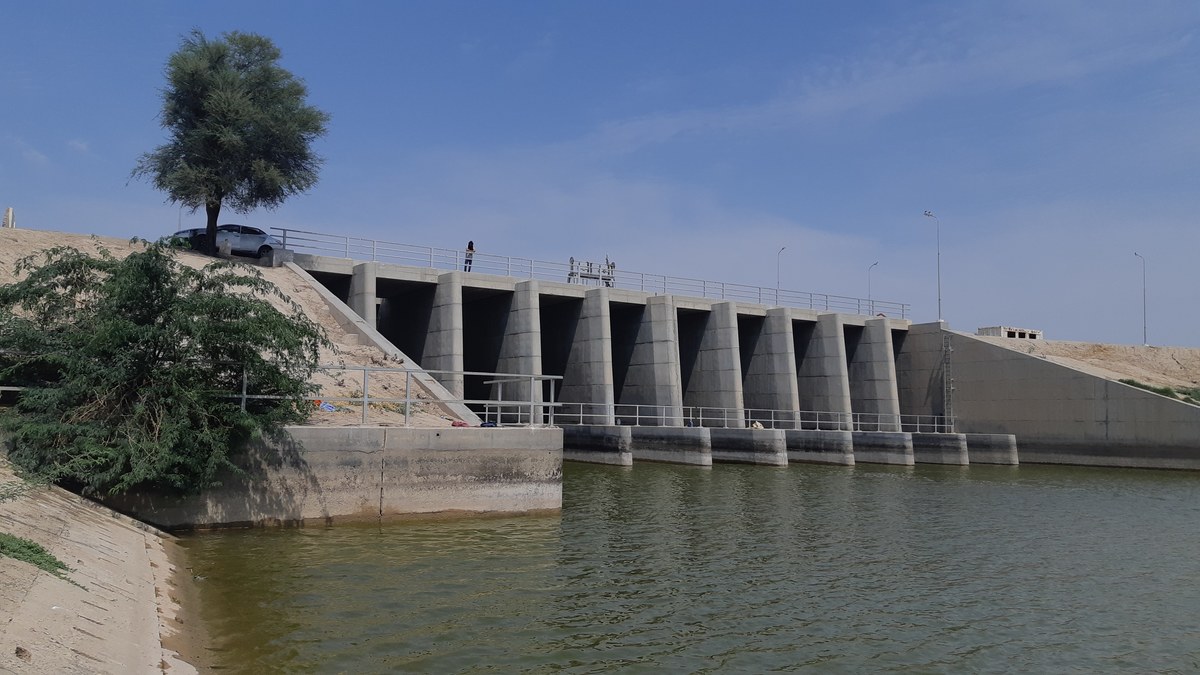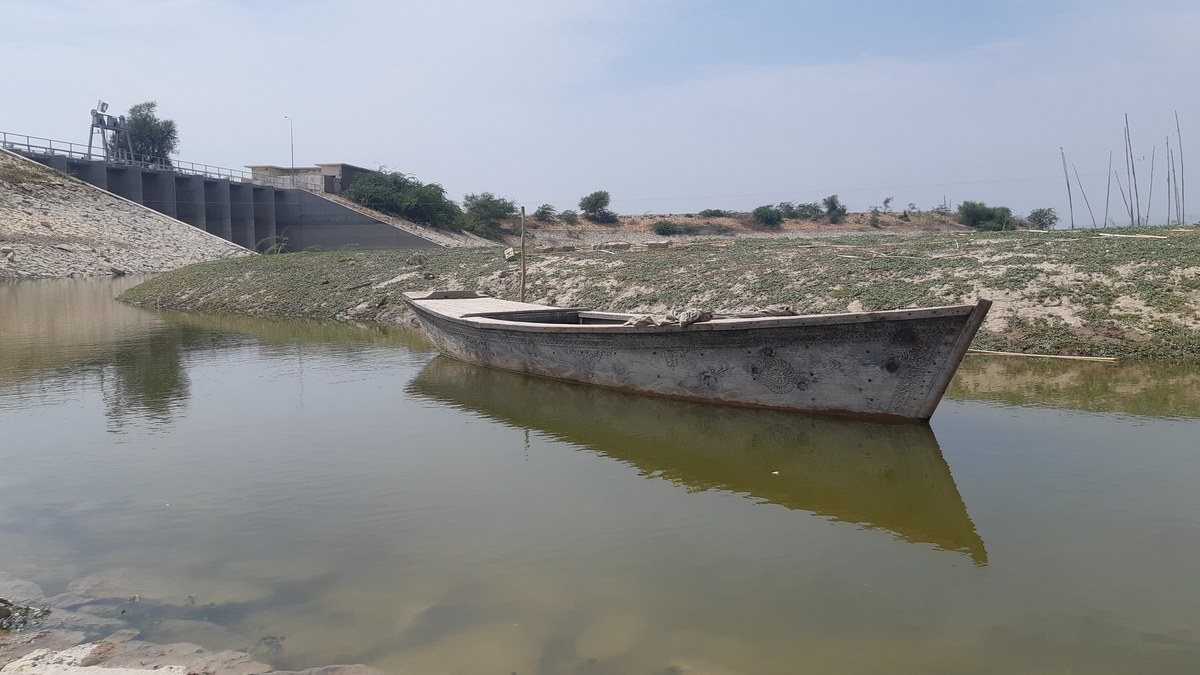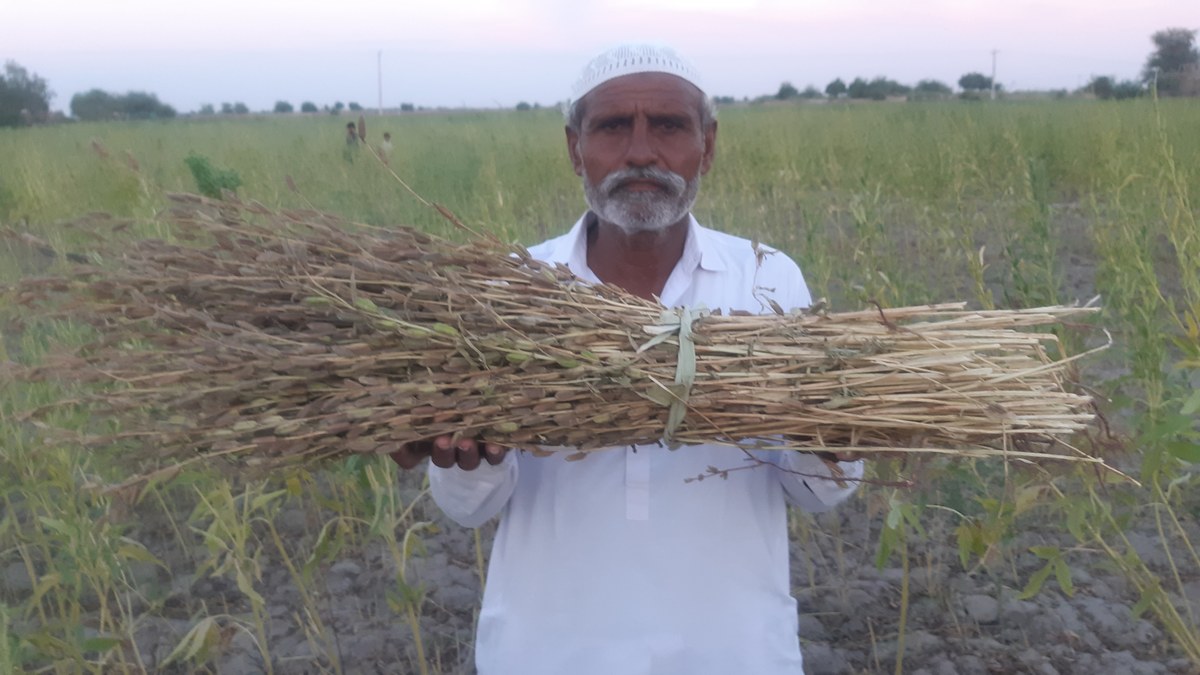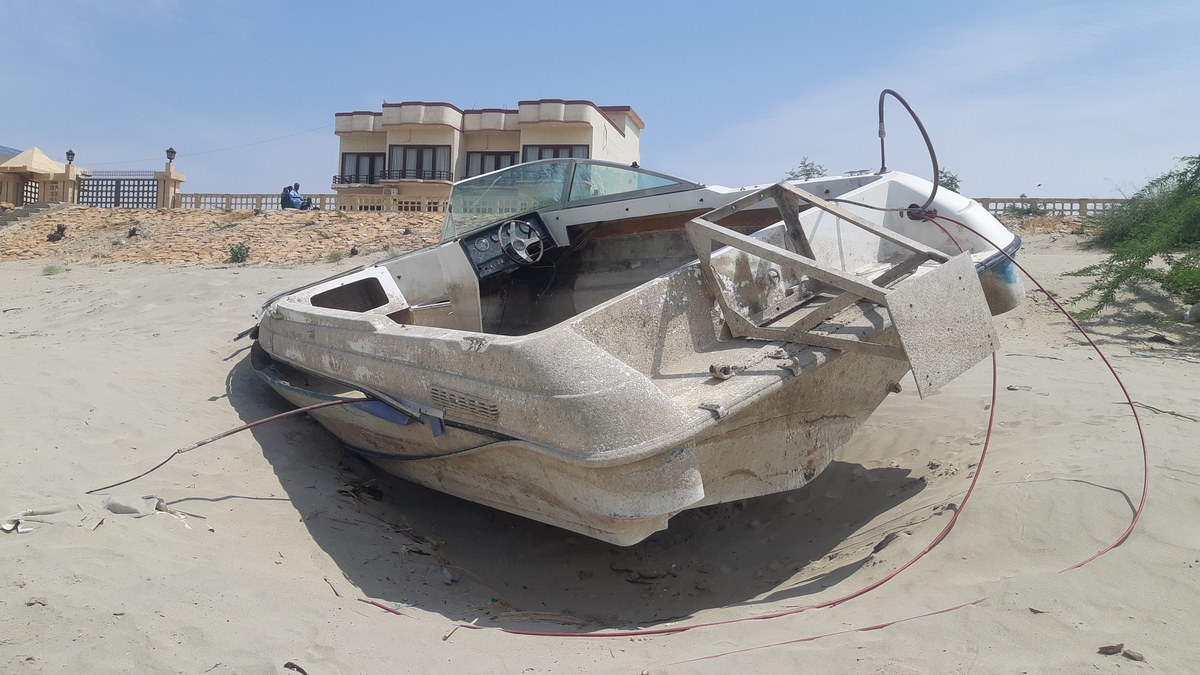SANGHAR: The Chotiari water reservoir, the second largest water storage facility in Pakistan’s Sindh province, is facing acute shortages and touched an “almost dead level” due to low monsoon rains this year, a senior Sindh irrigation official said on Friday.
While the development has been widely seen as a threat to the availability of drinking and irrigation water in the southern province, experts as well as some farmers described it as a blessing, saying the artificial lake had caused major waterlogging and soil salinity in its surroundings and thus destroyed agricultural land.
The Chotiari reservoir is situated on the edge of Pakistan’s Achhro Thar, or white desert, in Sanghar district bordering India. Historically, the Chotiari was a complex of deep lakes and riverine Makhi forests. It was turned into a reservoir in 2002.

A view of the gates of the Chotiari water reservoir in Sindh's Sanghar district, Pakistan, on September 19, 2021. (AN photo by Zulfiqar Kunbhar)
Lake Manchar, the largest natural freshwater lake in Pakistan, which is in Sindh’s Dadu and Jamshoro districts, has remained empty for over two decades, making the Chotiari reservoir, with a storage capacity of 0.71 million acre feet, a major source of drinking and irrigation water in the region.
Today, the water body is nearing an “almost dead level,” said Mansoor Memon, the Chotiari reservoir project director from the Sindh Irrigation Department.
If upper parts of the country did not receive enough rains in the ongoing monsoon season, he warned, water shortage in command areas of the reservoir could increase by up to 30 percent.
Already, the cultivation of kharif crops — planted February onwards and harvested till September — in the Chotiari reservoir command area has been reduced to half by the season ending September-end. And if rain patterns remain the same, the upcoming rabi, or spring harvest, will also see dangerously low crop yields, raising fears of food insecurity given that wheat is a major rabi crop.

An empty boat at the Chotiari water reservoir in Sindh's Sanghar district, Pakistan, on September 19, 2021. (AN photo by Zulfiqar Kunbhar)
“Prior to monsoon rains, it [water level in the reservoir] had reduced to 5 feet, touching almost dead-level,” Memon told Arab News, saying it was currently at 8 feet.
“If rainfall occurs as per forecast, we will touch the 15-feet level by November, which we call comfort level,” the official explained, saying if there were not enough rains and water continued to be supplied to the reservoir at existing levels from the Indus river, “we would face 30 percent water shortage in command areas in just the rabi season.”
The reservoir is filled through the Nara canal, the longest canal in Pakistan, which runs for about 364 kilometers, and irrigates 290,000 acres of land in the Sanghar and Umerkot desert districts. It fills up during the kharif season that falls between April and September.
However, fresh satellite and classified images obtained from the Sindh Agriculture University Tandojam (SAUT) show that 83 percent of the reservoir is empty.

Landlord Abdul Khaliq Junejo poses with his sesame crop in the surrounding area of the Chotiari water reservoir in Sindh's Sanghar district, Pakistan, on September 17, 2021. (AN photo by Zulfiqar Kunbhar)
“On the basis of classified images, we can say that on September 09, 2021, 93 percent of the Chotiari reservoir area was empty,” Prof Dr. Altaf Ali Siyal, an SAUT director for research, innovation and commercialization, told Arab News.
“With the arrival of water in the River Indus because of the monsoon, the situation improved slightly on September 18, 2021 and Chotiari was 83 percent empty. In the command area, Chotiari water is useful especially during rabi that starts from October or so,” he said, predicting severe water shortage in the reservoir’s lower Nara Canal command area in the upcoming rabi season.
Hajji Muhammad Shafi Palli, a 55-year-old grower from Umerkot district’s Kunri area, said he had cultivated cotton, pearl millet and sesame in the outgoing Kharif season, but his yield was half of the usual average produce.
His 40 acres (16 hectares) of agriculture land is fed through the Chotiari reservoir tributaries, covering around 150 kilometers. Palli and other growers in the area have already received an advisory from authorities for the upcoming rabi season starting October, with warnings to limit cropping area depending on water availability in the Chotiari reservoir and the volume of rain in the River Indus catchment area.
“After advisory, I fear that I may have to limit wheat production to four acres (1.6 hectares) as compared to my last year’s 20 acres of cultivation area,” Palli told Arab News. “Similarly, I would have to reduce other crops like mustard.”
But some are happy the reservoir is drying up.
Abdul Khaliq Junejo, 60, who owns 25 acres of agricultural land adjacent to the Chotiari reservoir, said a reduction in its water level was a blessing since water from the reservoir had been causing major waterlogging in its surroundings.

A boat is anchored in front of the Bakar Lake Resort at the Chotiari water reservoir in Sindh's Sanghar district, Pakistan, on September 19, 2021. (AN photo by Zulfiqar Kunbhar)
Indeed, a 2019 study by the University of Nevada, the American Society of Civil Engineers (ASCE) and Pakistan’s Mehran University of Engineering and Technology in Jamshoro said the Chotiari reservoir had caused major water logging, soil salinity and negative vegetation in the adjacent areas of the structure.
“I was able to cultivate a sesame crop this year after a gap of three years as the water level went low,” Junejo said.
According to Junejo and other growers, at the time of the reservoir’s construction, authorities promised to ensure the extraction of seepage water through tube wells and pumping stations, but these promises are yet to be fulfilled.
“Not a single tube well is working and there is no arrangement of seepage water management,” Junejo said. “As a result, there is hardly one crop all year, which has resulted in mass unemployment. Most locals have been forced to stop cultivating their own lands and migrate to other areas to work on others’ lands.”
Chotiari reservoir project director Memon acknowledged the complaints.
“Reduction of water in the Chotiari reservoir also means a blessing in disguise for the surrounding areas,” he said. “There is a scheme of 100 tube wells for the associated work of Chotiari reservoir seepage water extraction, but all tube wells are not functional because of electricity-related issues.”
















